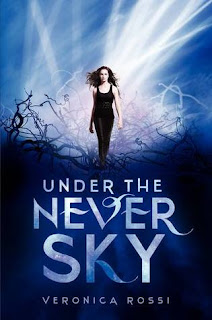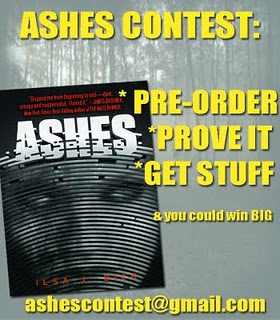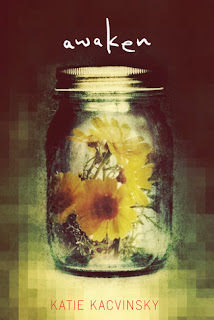For my spotlight on upcoming dystopian/post apocalyptic fiction series, I interviewed over 20 authors with novels coming out in the genre in 2012/13. These are exclusive first looks at exciting new works. Enjoy!
Dystopian August is thrilled to welcome Jennifer Bosworth. Her debut STRUCK is coming out with FSG (MacMillan) in Spring 2012 and the cover has just been revealed!
So let's check out that cover:

Here’s the teaser summary:
When Los Angeles is devastated by a catastrophic earthquake, seventeen-year-old human lightning rod, Mia Price, finds herself at the center of a power struggle between two fanatical doomsday cults, one that wants to save the world, and one that wants to destroy it . . . and she will be the deciding factor in which cult succeeds at their aim.
And the interview:
What do you think draws people to "dark" stories?
I’ve heard so many insightful answers to this question recently––due mostly to that infamous Wall Street Journal article and the ensuing backlash––I don’t want to make a blanket statement and try to encompass everyone. Instead, I’ll speak to what draws me to dark stories: addiction. Dark stories are my crack. They got into me at a young age, probably starting with one of those little Halloween picture books, or maybe with a movie like “Watcher in the Woods,” which was released from Disney, but is still one of the scariest movies I’ve seen. (Lenore's note: OMG - Watcher in the Woods! I still have nightmares from that!) As with most addictions, the more you feed them, the more powerful they grow. At ten, I started sneaking my parents’ Stephen King and Peter Straub and F. Paul Wilson novels and devouring them. Also, my dad owned a video store so growing up I got my hands on all kinds of delightful horror movies, the good the B and the gory. As far as drugs go, darkness was cheap and readily available.
At least no one ever tried to send me to rehab.
For me, there are two kinds of people: those who were exposed to dark stories as a kid and got the hunger, and those who were exposed and said, “Eeek. Not for me!” But what makes a potential “darkness” addict? Who knows? Maybe it’s in the genes. I believe what set me on the path was contrast. My life was safe. I grew up in a small town in Utah, where locking the doors was low priority, and nearly everyone went to church on Sunday. It was . . . pleasant. It was boring. I needed more than what regular life could provide. I needed conflict and danger.
I needed to see in the dark.
If STRUCK had a theme song, what would it be and why?
Thunderstruck, AC/DC. Yep, my old school rocker roots are showing.
What fictional character from another book would Mia Price chose as her best friend and why?
Mia’s a bit of a loner, so I think if the choice was hers she’d go for another loner, maybe Roland Deschain from Stephen King’s “Dark Tower” series. I could see the two of them sitting around a campfire in the desert, staring in the flames and ignoring each other. But as Mia’s god and creator, I know what’s best for her, and I would choose someone more like Eddie Dean from the “Dark Tower,” a tenacious chatterbox who wouldn’t give her a moment’s peace. She’s spent too much time alone. She needs a loudmouth friend like Eddie.
What are your top 5 Dystopian lit recs and why?
1. “The Dark Tower” series, by Stephen King – I don’t know if you can actually call this dystopian. It’s more like a post-apocalyptic fantasy/horror western, but I take every opportunity I get to talk about how much I love this series. It begins with an aging gunslinger pursuing a mysterious man in black across the desert of a barren world that’s “moved on,” and takes you to so many places over the course of 7 ever-lengthening books that by the end––which is one of the greatest endings of all time, if you ask me––you feel like you’ve lived the books.

2. Little Brother, Cory Doctorow – This book does not take place in a nightmarish future far, far away. It takes place in a nightmarish future that could happen tomorrow. Hell, it might already be happening now and we just don’t know it. Seventeen-year-old Marcus and his friends are in the wrong place at the wrong time during a terrorist attack, and are taken into custody by Homeland Security for interrogation. Marcus is released and warned never to speak of what happened because Big Brother will be watching him always. The problem is, Homeland Security didn’t release his best friend. This book redefined the way I think about technology, terrorism, freedom, and dissent. Unforgettable.
3. “The Long Walk,” Richard Bachman – This novella, written by Stephen King under the pen name Richard Bachman, has haunted me since I was eleven. It’s about 100 boys who enter a walking competition. All they have to do is walk. But if they stop for too long, they’ll be shot to death. The last one standing, or in this case, walking, wins. The rest of them . . . well, they lose. The situation was riveting, but learning what motivated the boys to enter such a contest was the part that really fascinated me.
4. “Z For Zachariah,” Robert C. O’Brien – Again, this is post-apocalyptic rather than dystopian, but it’s still about a crappy future. In the aftermath of a nuclear holocaust, 16-year-old Ann is left completely alone in the geographically protected valley where her home is located. But when a dangerous stranger arrives in town, she realizes being the last person on earth wasn’t so bad. It’s a thrilling novel, and I appreciate the simple, straightforward writing, which doesn’t get in the way of the story.
5. “Blood Red Road,” Moira Young – This is the most recent dystopian/post-apocalyptic novel I’ve read, so it’s fresh in my mind, but that’s not why I’m including it on the list. This book is simply incredible. It’s like “Mad Max” meets Cormac McCarthy’s “The Road.” It practically has its own language, which is at once harsh and poetic. Many words are missing one or more letters, and there’re no quotes to indicate dialogue. The heroine is a tough as nails warrior who could give Katniss Everdeen a run for her money, and she kicks an epic amount of ass. Also, there’s an ever so subtle supernatural slant, which is my favorite spice. I hope the YA reading public embraces this book.
What's on the top of your to-do list before the world ends? (you know, in case it ends next year)
Well, having a book published is on that to-do list, but whether STRUCK is released before The End is up to fate. Next on my bucket list is a trip to Romania. I’d also love to rent a haunted castle someday, just for kicks.
What sets your novel apart from others in the genre?
I’m so glad you asked this question. I should start off by asserting that STRUCK is not strictly dystopian, so that’s the first distinction. But post-apocalyptic and dystopian stories share so many themes and fundamentals that there isn’t much point splitting hairs.
There are two major elements that set STRUCK apart from other dystopian novels.
•Dystopian novels and post-apocalyptic novels are both about nightmare futures, but dystopian tends to make a jump ahead in time, usually of several decades, if not hundreds of years. STRUCK begins one month after a massive earthquake has destroyed much of Los Angeles.
Dystopian novels, by and large, are about the terrible places that fear can take us if we get on board. When you begin reading a dystopian novel, you’ve already arrived at the destination. In STRUCK, you get a glimpse of the kind of fear and chaos that puts people on a train to Dystopialand.
•The second thing that sets STRUCK apart is the supernatural thread that runs through the story. As you’ll surmise from reading my top 5 list, I’m a Stephen King fan of the Annie Wilkes variety. Okay, maybe not that obsessive, but I’m not ashamed to say I love the man. He’s inspired me and taught me more than any other writer. In many ways, STRUCK is my homage to his “Dark Tower” series.
Now, one thing I learned from Stephen King is that the supernatural has a place even in tales of gritty reality. What would “The Stand” have been without Randall Flagg and the shared dreams of the survivors? It would still have been a great book, but it wouldn’t have been, for want of a better word, magical.
STRUCK is a story of tragedy. It’s a story about what happens when a city crumbles in the space of three minutes. It’s a story of temporary insanity and religious obsession and what happens when people let fear take root, and when they let the wrong people do their thinking for them.
But it’s also a story about the mysteries of our natural world; about the destructive and creative potential of something as common as lightning. Magic is often the word people use when they don’t understand something, and there are few things more misunderstood or mystifying than lightning.
So, at its heart, STRUCK is a story about magic, and that sets it apart from other dystopian novels.
Thanks Jennifer - sounds so intriguing!
Visit
Jennifer’s website
Follow Jennifer on twitter @JennBosworth
Add STRUCK to your
GoodReads wishlist
Jennifer is also a part of
Brave New Words, a group blog for YA sci-fi debuts in 2012









































